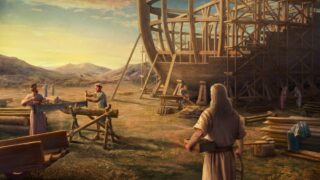Text: 2 Samuel 9:1–13
“So Mephibosheth ate at David’s table like one of the king’s sons.” —2 Samuel 9:11
Have you ever expected judgment or condemnation from God, only to experience His kindness instead? I remember this being my reality as a wayward teenager who felt very unworthy of Christ’s love when a “juvenile detention center missionary” shared the Gospel with me in a place of desolation and despair. The kindness of God led me to repentance, and it changed my life.
Mephibosheth’s life was marked by brokenness. Crippled since childhood, he was living in obscurity in a barren place called Lo-Debar. The forgotten grandson of a fallen king, Mephibosheth was a man lost in the margins, bearing the wounds of someone else’s downfall. By all human standards, he had nothing to offer. We could say he was irrelevant.
The Hebrew word Lo-Debar literally translates to “no word” or “no pasture.” It is sometimes interpreted as “nothing” or “nothingness.” For Mephibosheth, Lo-Debar represented barrenness, exile, and silence. And yet, King David remembered him because of a covenant he had made with Jonathan, Mephibosheth’s father. David sent for him, not to punish or shame him, but to bless him with unimaginable kindness.
Think about Mephibosheth, dragging his crippled feet into King David’s palace, timid and uncertain. He had no claim to the throne. He expected judgment but instead was overtaken by these surprising words from David: “Do not fear, for I will show you kindness for the sake of your father Jonathan… and you shall eat at my table always.” (2 Samuel 9:7)
Despite his brokenness, Mephibosheth was honored and valued—not because of what he could offer, but an effect of the king’s love and loyalty. That’s grace. And that’s our story too. God seeks out the weak and broken, lifts them up, and gives them a place of belonging through His love and faithfulness.
We are all Mephibosheth—broken, spiritually crippled, and far from the presence of the King. Due to of our sinful condition, we are incapable of “walking” rightly before God on our own, and unable to come to God through our own strength or merit. But God, because of His covenant love through Jesus Christ, comes to us and calls us out of exile. He rescues us from nothingness. He invites us not just to visit His presence, but to sit permanently at His royal table and live as sons and daughters in the abundance of His Kingdom.
This is not about what we’ve done or what we deserve. It’s about what Christ has done—and the unrivaled kindness of the King. Think about that as you seek to abide in Him this week and worship Him in the beauty of His holiness.
PRAYER
Father, thank You for Your kindness that seeks me out even when I am broken, hiding, or feeling exiled. I confess that I often feel unworthy of Your love. But today I receive Your grace. Thank You for preparing a place for me at Your table—not because of what I’ve done, but because of who You are. Help me to live daily in the truth of Your mercy and kindness. In Jesus’ name, amen.
Questions for Personal Reflection or Group Discussion:
- When has someone shown you unexpected kindness?
- In what ways has God’s kindness led you to repentance?
- Where in your life do you feel spiritually crippled or unworthy?
- What does it mean to you personally that God has given you a seat at His table?
- How should the story of Mephibosheth shape our worship of God?


